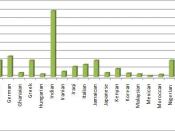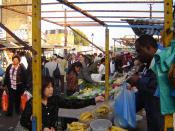When two distinct groups first come into contact with each other, the conditions of that meeting can determine the fate and mold the relations of the two groups for generations. This is called the "Contact Situation." Donald Noel and Robert Blauner have analyzed this initial contact and developed hypotheses that aid in the understanding of this phase of the inter-group relations.
The Noel hypothesis recognizes that there are three segments to the contact situation, that when working together, lead to some sort of inequality between the groups. The hypothesis states: If two or more groups come together in a contact situation characterized by ethnocentrism, competition and a difference in power, then some form of racial or ethnic stratification will result (Noel, 1968, p. 163). In other words, if the contact situation contains all three of the situations, ethnocentrism, competition, and a difference in power, then some sort of dominant-minority social structure will be created.
Ethnocentrism is defined as the tendency to judge other groups, societies or lifestyles by the standard of one's own culture (Healy, 1999, p. 175). At some level, ethnocentrism is a necessary part of human culture. Without it, people would tend to not obey laws, social norms or work with others in every day life. Ethnocentrism can also create a negative effect. At the extreme end of it, it can create the view that other cultures are not only different, but are also inferior. When ethnocentrism exists at any level, most people follow group lines and tend to differentiate between "us" and "them" (Healy, 1999, p. 175)
Competition is a struggle over a scarce commodity (Healy, 1999, p 175), and usually leads to prejudice and discrimination. In contact situations, the dominant group is the one that come out on top of the competition. Competition can be over...


